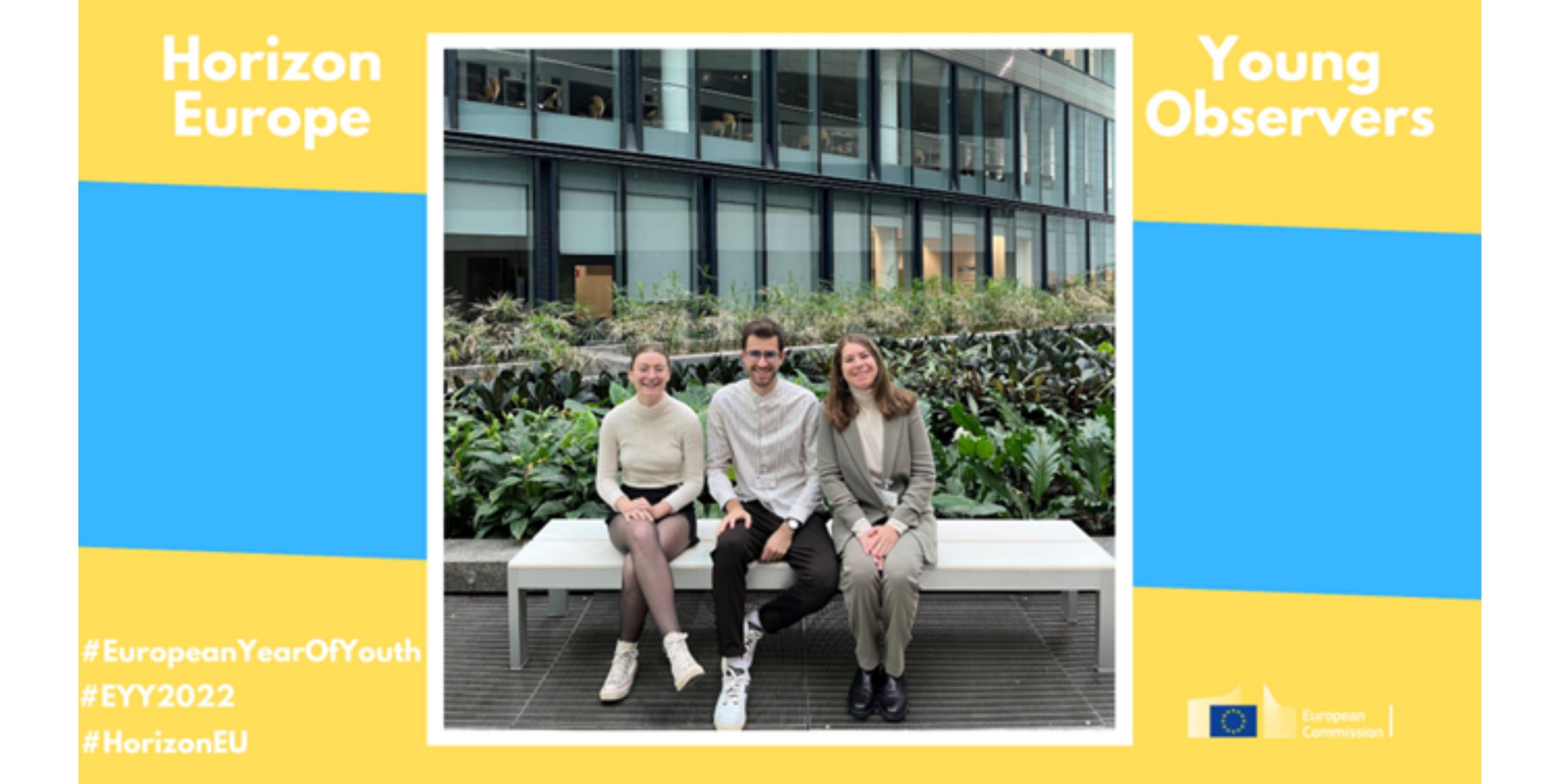Interested in how research projects acquire EU funding? Don’t miss this interview with the current Young Observers for insights on the process and tips for a successful application. Deadline to apply for the next round is December 14!
Students enrolled in a master’s programme in an EU Member State can apply to the Young Observers programme. If selected, they will be invited to observe the critical evaluation phase (whether projects receive EU funding or not!) of research and innovation projects the European Research Executive Agency (REA) receives.
These projects can touch on numerous topics: mitigating the effects of the climate crisis, improving the lives of migrants in Europe, increasing cybersecurity amongst others; feeding into major EU policies such as the European Green Deal, the Digital Decade, and the EU Missions in Horizon Europe.
We talked to Francesca, Marie and Rodrigo – some of the very first Young Observers. They were at REA’s office in Brussels to observe project evaluations.
How did you hear about the Horizon Europe Young Observers?
‘Through the university where I completed my master’s degree’ Marie told us. ‘I was really interested because at the time I knew I was going to work with European Innovation Council and Horizon Europe programmes. It was the perfect opportunity to see both sides of research; how to manage an EU grant and how it is selected.’
Francesca learnt about the Young Observers initiative through LinkedIn and like Marie received ‘immediate support from my university as soon as I contacted my supervisor.’
Rodrigo found out about the Young Observers through a project he worked with while living in Maastricht: ‘they send us different opportunities for young people in Europe. I applied to the Young Observers because I thought it was interesting.’
How have you found the experience as a Young Observer?
‘Everybody here at REA was super approachable and happy to give us advice, explain their work, the challenges, benefits and even the risks associated to the evaluation process’ Francesca continued ‘the topic was completely new for me and I found myself surrounded by university professors and hyper-specialised professionals. This diversity was of course extremely interesting.’
As someone with first-hand experience in project management, Marie was surprised about how well organised the experience has been.‘We have a mentor, everything was well explained, and we could ask questions. It’s an open process; it’s great, really great’.
Rodrigo was equally ‘impressed’ by how detailed and carefully prepared the process is. He also discussed his experience evaluating projects not directly related to his academic background: ‘in the end, we are observers; we are not looking into the proposals but how the experts analysed them.’
How do you think this can impact your career?
Rodrigo continued his previous point: ‘there are commonalities between different research calls and in research, everything is very entangled’ which is why Rodrigo believes this experience, while specific, can be useful for his career.
Francesca has her sights on a career related to European project management and funds. ‘I’m confident this will also have a positive impact on my future career because having hands-on experience on how the process of the EU-funded projects work is not something that everyone has access to. It will be for sure an important skill that will enrich my CV.’
‘I think I can take with me some interesting findings, particularly for the laboratory where I currently work. They want me to help “demystify” the project evaluation process’ Marie told us. ‘My university is equally curious to better understand how the European Commission selects research projects’ she continued.
What advice would you give to other students when applying to become a Young Observer?
Marie was clear: ‘I have to stress the importance of the motivation. This was confirmed to me when I talked to the call coordinator; in charge of selecting the Young Observers’
Francesca told us about what sort of profiles should apply; ‘I think this programme is mainly for two kinds of profiles: people with management studies and experience in procedural system of European funds management of proposals and for scientific profiles.’
Rodrigo gave some words of encouragement to students interested in the initiative: ‘you should apply, enjoy the experience as much as you can and make the most out of it’. When asked if he recommends it Rodrigo replied ‘yes, I highly recommend it’.
2022: A year of opportunities for young people
The European Year of Youth is all about promoting opportunities for young people in Europe and beyond, building networks for young voices to be heard in EU institutions, and placing young people’s needs at the centre of our work.
In line with this, the European Commission has launched several initiatives including the new Horizon Europe Young Observers programme. The call for expression of interest to become a Young Observer is open until December 14. Don’t miss out on this opportunity and apply now!
Check out the European Youth Portal for more information on other initiatives and programmes.
Additional information
REA manages several research topics under Horizon Europe – the EU’s framework for research – and other EU-funded research programmes. Throughout the year, calls for proposals for funding open, divided by topic. Independent and external experts, joined by observers, evaluate the proposals REA receives and decide the proposals that receive funding. The Young Observers partake in this phase of the process.
Find out more on the evaluation phase, the experts, and Horizon Europe.
Follow REA on Twitter and LinkedIn for regular updates on topics like this, as well as other research-related news. Follow our account dedicated to research into sustainability, biodiversity, the circular economy and other green topics.
Source: European Commission I European Research Executive Agency (https://bit.ly/3gs8AJd)
